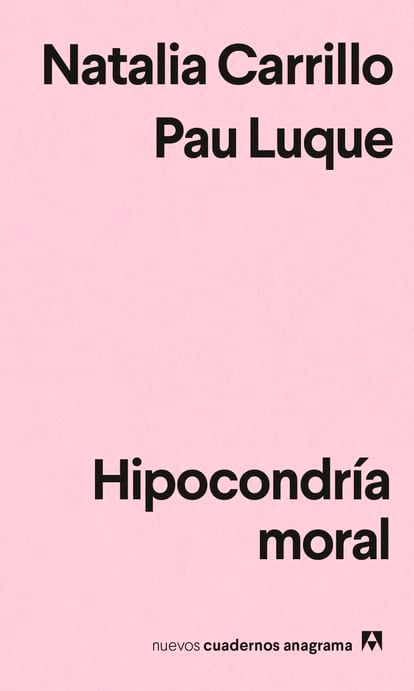An Italian restorer examines the painting "Narcissus" by Italian Baroque master Caravaggio.Bernd Settnik (picture alliance via Getty Image)
In
The Heart of Man
(1964), Erich Fromm devotes a chapter to narcissism, whose discovery, at least as a psychic phenomenon worthy of being theorized, he attributes to Freud.
A relatively interesting example of narcissism is that of physiological hypochondriasis.
A hypochondriac is someone who interprets any perceived or imagined change in their body as a symptom of illness (usually a serious illness, otherwise what fun would it be to be a hypochondriac?).
The concept of narcissism allows us to explain a series of psychic aspects and is one of the great contributions of psychoanalysis.
The concept is first used to describe the way young children insert themselves into the world before they can realize that they are not the world, but are in it.
Originally, babies do not perceive the boundary between themselves and the environment.
The initial state, in which the baby thinks he is the world, Freud called primary narcissism.
As they develop the ability to control their body, but not other objects, a slow process of several years begins in which that narcissism is beaten by constant frustrations, until the girl or boy manages to put aside the primary narcissism and learns to relate with the other as external objects.
From that primary narcissism we retain, to some degree, the feeling of being the center.
Depending on how much of that narcissism is withheld, people develop, to a greater or lesser extent, certain capacities.
The ability to be empathic, for example, is quite far from narcissism, because it requires understanding that there is an object (another person) that has a psychic life independent of ours and feels and perceives things different from what we feel and perceive.
But we cannot completely get rid of the fact that we perceive the world from a certain place.
We always have a perspective, and we tend to appreciate what is particular and special about that perspective.
We fall in love, so to speak, with our perspective because it is ours.
We irrationally prefer our misery to that of the other, our own farts do not displease us, but we abhor those of others —as Ferlosio well knew when he described nationalism as “the morality of the fart”.
Acting as if our point of view is special, desirable, is a trait that can be understood as a remnant of primary narcissism.
Sometimes we perceive a color to later recognize that the light made us see it in a tone that it is not.
Sometimes we feel that someone is arrogant, but that feeling may be nothing more than a projection of our psychic life.
That may be the case, too, for some severely mentally ill.
For the person with paranoid disorder, her feeling of being persecuted indicates that someone is indeed after her.
He does not conceive of the possibility that he feels that he is being persecuted without there being someone who is persecuting him.
Fromm called that outright narcissism.
At one extreme, then, we have the totality of the primary narcissism of the child and the absolute narcissism of the sick person.
In the first case, narcissism is part of a stage of development, in the second it is a degeneration caused by some kind of imbalance.
But in both cases there is a lack of differentiation between the inner life and the outer world.
The world is me.
Cover of the book 'Moral hypochondria' by Natalia Carrillo and Pau Luque (Editorial Anagrama, 2022).
At the other extreme would be those who manage to understand that there is absolutely nothing special about their point of view.
Perhaps some Buddhist religions aspire to such a state of mind when pursuing the dissolution of the ego.
Yet most of us retain a certain degree of narcissism, which Fromm argues has an evolutionary function: why would I fight for my livelihood if my self were totally irrelevant?
An adaptive level of narcissism gives us reasons to want to subsist, each one, in their individuality.
There is, therefore, a spectrum of non-pathological narcissisms (some are more functional than others, some are more encompassing than others), and most of us find ourselves within that spectrum.
We all believe that, in one way or another, we are special, although that does not make us pathological narcissists.
The pathological drift of narcissism begins when one loses the ability to distinguish between one's point of view and reality.
Thinking of oneself, seeking oneself, even being occasionally selfish, is not enough to accuse a person of pathological narcissism.
Pathological narcissism is failing to see the other, failing to be interested in the world in the sense of failing to recognize that one is in a world that is independent of what one thinks and feels about it.
Thus, Fromm explained hypochondria in narcissistic terms.
The hypochondriac has to some extent lost the ability to distinguish between his inner life and reality: he feels that he is sick and that is enough to believe that he is.
Not even the doctor can dissuade him.
The hypochondriac is self-centered and takes his point of view as reality.
The moral hypochondriac is also in a pathological narcissistic state.
Only this time it is his social health, so to speak, that would be at stake.
The moral hypochondriac has two mixed narcissistic traits: thinking that he is more important than he really is, on the one hand, and not being able to distinguish between feeling that he has done wrong and having actually done wrong, on the other.
The moral hypochondriac feels indignation about some event without implying that an injustice has actually been done;
rather it is, again, a projection of his own psychic life.
These traits show that the person has difficulty distinguishing between his point of view and reality.
Natalia Carrillo
(Mexico City, 1984) is a neuroscientist and philosopher of science.
Pau Luque (Barcelona, 1982) is an essayist.
This excerpt is a preview of the book 'Moral hypochondria', by Anagrama, which will be published on June 1.
Sign up for the weekly Ideas newsletter
here .
Exclusive content for subscribers
read without limits
subscribe
I'm already a subscriber


/cloudfront-eu-central-1.images.arcpublishing.com/prisa/5NCFIXHGXJFS3MMZW77BGM3BPY.jpg)






/cloudfront-eu-central-1.images.arcpublishing.com/prisa/6N6KTXOAZVACJJXKBZX5NJNUZY.jpg)



/cloudfront-eu-central-1.images.arcpublishing.com/prisa/KMEYMJKESBAZBE4MRBAM4TGHIQ.jpg)

